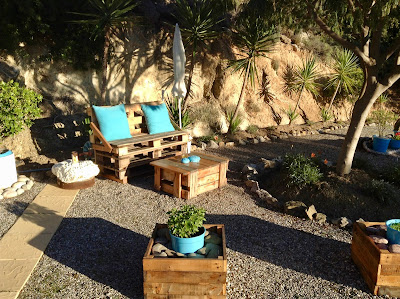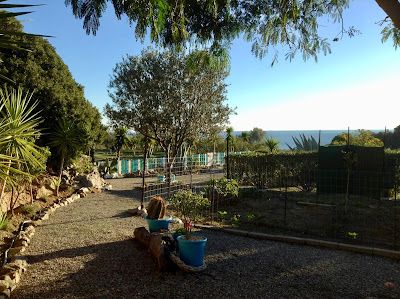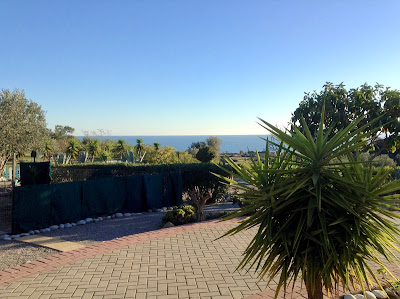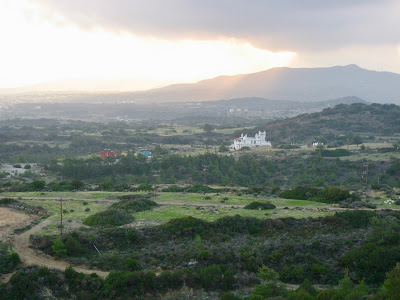 |
| Glystra Beach, December 12th 2017, around 1.30pm |
I like to keep things light. Anyone who reads my stuff on a regular basis will know that. I would never, though, describe myself as frivolous. Regarding how others would describe me, well, there's not much I can do about that anyway and I don't much worry about it, as long as my integrity and honesty and, dare I say, humility, hopefully would influence what they'd say. OK, OK, it's hard to be humble when you're doing all the talking, but there it is. I do my best.
Today we walked to Glystra Beach and took a dip. We usually do it at least once during a winter and we know that the walk takes us about an hour each way. It's beautiful there in the winter. It's a perfect sandy beach and today, as we'd hoped and expected, we had the place entirely to ourselves. Oddly, it was this visit to such a beautiful place with the temperature around 20ºC that got me thinking about some sad news we had just this week from some Albanian friends that we've known for at least four or five years. We're not counting, but it must be at least four anyway.
My better half and I moved out here after evaluating our financial situation and deciding that, if we were careful, we could make a go of it and not be too stretched financially. Thus we were willing migrants who could also, if we wanted to, return to our home country at any time.
Of course, the news has been full of the stories of so many migrants fleeing wars and those who survive arriving on European shores in the last few years and it so makes our hearts heavy when we see what is happening to them. But I don't think many of us give much thought to the Albanians, and why should we, by and large? We don't really hear about them and, certainly in places like the UK, they're not news at all. People there would probably be hard put to even say where Albania is, apart from one of my favourite writers and comedians, Tony Hawks, of course. Check out his brilliantly funny book "One Hit Wonderland" and you'll see what I mean.
So I'd like to talk for a while about just how this family of Albanians that we know and indeed love, have made me become very meditative this past day or two since we learned that they're on the move again, this time to Dortmund in Germany.
Greece is full of Albanians, that's a fact. There is quite a sizeable population of them in Italy too, but I suspect that most of those who've left their homeland have ended up here in Greece, at least for a while. In 1990 the population there was around 3.25 million, so it's a small country. Consider, for example that the population of London currently stands at around 8.6 million. Albania's an even smaller country now though, because over a quarter of a million have left their motherland since then and the current population stands at something near 2.9 million.
We've been on Rhodes for twelve years and in that time have made quite a few friends with people who were born and raised in Albania. By and large they are hardworking, friendly and family-oriented people who get the short straw when it comes to how they're treated by the Greeks. Often when something 'happens', like a robbery or a drug arrest, people here will often immediately assume that the perpetrator must be Albanian, even though statistics show that this simply isn't any more likely than it being a Greek. By far the majority of them living here make do with substandard accommodation, work long hours in the tourist industry for a pittance and yet greet you nevertheless with a smile. I have first-hand experience of how many Greek employers talk to their Albanian workers and it's not pleasant.
I'm not trying to tar everyone with the same brush. I should add that I also know many Greeks who value their Albanian workers and treat them well. I'd be very remiss not to refer here to one of our favourite tavernas, Savvas Grill in nearby Lardos village. There are two young Albanian women who've been working in the kitchen there for well over a decade and they, I know, are very good workers, much appreciated by their employers, Savvas himself and his wife, who works along with them in the kitchen.
The fact is, though, that the family I'm referring to are far from being an exception when it comes to living as reluctant itinerants. The family consists of dad, mum, two teenage girls and a son of about eleven. They may have been on Rhodes for about five years, but prior to that they lived in Crete for many years too. Why do they move? The simple answer is to find work. A sizeable number of Albanians, often with young children, have to move almost every winter when their seasonal jobs come to an end. It's the lucky ones who get to keep their job from one season to the next, but even these frequently pay exorbitant rents for what residents in the UK would call a hovel. They get charged over the odds for their electricity and often live in old tourist accommodation that's no longer fit for purpose. So, the owners of such properties let them to foreign workers who have little option but to accept a place where the bathroom floor is perpetually wet and the sockets are hanging out of the walls. They often don't have what civilised people would call a kitchen, usually making do with a gas bottle and one of those duel gas-ring contraptions that British people would use when they go camping. The wardrobes, if they even exist, have doors that are hanging off the hinges and the gaps under the exterior doors allow gale force winds to blow across the floors on cold winter days and nights.
Thus, lots of Albanians we've known have moved house even in the same area perhaps three times in five years, always searching for somewhere in better repair and where they won't pay a small fortune for their electricity.
Our friends, like I said, have three children. These have grown up in Greece and to all intents and purposes feel Greek. They are part of the Greek system and have Greek ID cards. These young folk prefer to converse in Greek than in their parents' mother tongue. Kids are often more adaptable than grownups, after all.
Yet, owing to the ever increasing numbers coming here in search of work, it's getting harder for them all. Other Albanian friends of ours only recently had three cousins staying with them who'd arrived from Italy, hoping to get work here on Rhodes and settle here. Finding somewhere to live even if they do find work will be a huge challenge.
There are Greeks, perhaps influenced by the extreme right party Golden Dawn, who hate the Albanians being here. These, though, forget that a couple of decades ago they were only too pleased to welcome them, since they were willing to work at menial jobs that the Greeks didn't want to descend to. Now, with all the economic woes that have afflicted the country in the last few years, they suddenly accuse foreigners of stealing jobs from the Greeks.
Our friends, after well over a decade in Greece, both on Crete and latterly here on Rhodes, have reached a huge watershed in their lives. The father lost his job part way through the season last year, of course walking away with several months' wages owing him as well, which is also far from a rare occurrence here, and he's been getting more and more depressed ever since. Both he and his wife speak pretty good Greek after all these years and by and large like it here. But they're now having to move to Germany. That means another new language to learn, a new climate to adjust to, a new governmental 'system' to learn about and the jobs that they hope to be going to are as meat packers in a sausage factory. Here, although her husband hasn't had work for a while, the mother/wife has been working in a hotel that's amazingly allowed her to have Sundays off all through the season, which is extremely rare here. But she's having to give that up because they don't want to be separated, with the father living indefinitely in Germany and the wife and children here in Greece. Not to be forgotten will be the challenge of adjusting to the climate too.
Two fifteen year olds and an eleven year old will be faced with entering a school system in which they don't speak the language. They're on the move again because they have no choice. Such is the lot for so many people from Albania in this modern world. What's really gut-wrenching for such folk too is the fact that they all have nice houses back home in Albania. Several of the Albanian couples that we know have shown us their photos of their houses back home. They have gardens around them, with fruit trees and with bougainvillea growing up their pergolas. But they can't go back because there is no means of living if they do.
I read recently (again, as it happens) that the five most stressful things that can happen to someone in life are as follows:
- Death of a loved one.
- Divorce.
- Moving.
- Major illness or injury.
- Job loss.
Note that not one, but two of the above apply to these poor unfortunate reluctant itinerants. Imagine the stress they suffer and the long-term effects of such. Long-term stress sufferers aren't always aware of the effects of such things until later in life, when they succumb to all kinds of physical, even psychological ailments.
So, as we bade farewell to our friends amid much hugging and shedding of tears a few evenings ago, I found myself contemplating just how fortunate me and my beloved really are. We aren't faced with a 2000 kilometre journey into the unknown, at least not unwillingly. We could always retrace our way back to our heritage and roots were we to wish to do so. Quite how it must feel for whole families to have to re-locate half-way across Europe just to find ways of making ends meet is something we'll never experience. To live with the thought that there is no way of knowing if you'll ever be able to go home must be immensely depressing, hugely distressing.
Yet, still when we visit others of our Albanian (even Bulgarian for that matter) friends, they are happy, they laugh, they make us a meal of delicious home cooking in what could never be described as a kitchen, and we sit and enjoy their company while they smile and pour us a glass of cheap wine. They toil over (those who are lucky enough to have it) a vegetable patch and won't let us leave without picking us a carrier bag full of peppers, onions, aubergines and tomatoes. In short, they cheer us up.
Count your blessings folks. That's what we did yesterday as we took a dip in the sea on a wonderfully deserted Glystra Beach.
There are so many people who are hard put to find any in their lives to count at all.


























